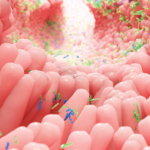Prebiotics are indigestible foods, such as fiber, that may be fermented by bacteria in the colon, stimulating the growth of healthful bacteria, said Dr. Mills. Prebiotic intake may help reduce the prevalence or duration of infectious or antibiotic-associated diarrhea and reduce IBD inflammation, he said.
Breast milk is one food that combines probiotics, prebiotics and nutraceuticals, and serves to both feed the infant and modulate its microbial composition, said Dr. Mills. Lactoferrin in breast milk specifically leads to the production of probiotic enzymes, and milk expresses proteases that yield protective antimicrobial peptides.
Helpful Helminths
Our modern practices of hygiene, including the use of antibiotics and antiseptic cleansers, have altered the composition of the organisms living in our gastrointestinal tract, said Joel Weinstock, MD, professor of medicine at Tufts University in Boston. Helminths, or intestinal worms, once lived in our gut. They are now gone. Their presence may help prevent and treat autoimmunity, he said.
Helminthic infections are more common in the developing world, where hygiene and food safety are poor. There are signs that the immune systems of people with helminthic infections are better regulated and inhibit excess reactivity, which in turn, decreases our likelihood of getting immune-mediated diseases, such as Crohn’s disease and ulcerative colitis (UC).
“But I’m not an enemy of hygiene!” Dr. Weinstock said. Improved sanitation helps control water-borne diseases, such as cholera. “Not all organisms make us sick, and some may protect us. But we’re eliminating all of those too.” A thin layer of mucosa in the gut and our intestinal immune system protects it from absorbing intestinal bacteria, but an overactive immune system directed against these bacteria can damage the intestinal epithelial lining and cause disease, said Dr. Weinstock.

Helminths live in the gut lumen. They may modulate the immune response and protect us from certain autoimmune diseases, such as UC, he said. People exposed to eggs of trichuris suis, the porcine whipworm, may be less susceptible to UC, for example. Helminthic infections may activate regulatory T cells and induce regulatory dendritic cells that help control colitis, he said.
Someday, doctors may be able to harness these parasites in the form of protective vaccines against immunological diseases, said Dr. Weinstock. “Indiscriminant exposure to a large variety of organisms in our environment also may decrease the incidence of these diseases.” However, “nobody wants to go back to living in filth.”


